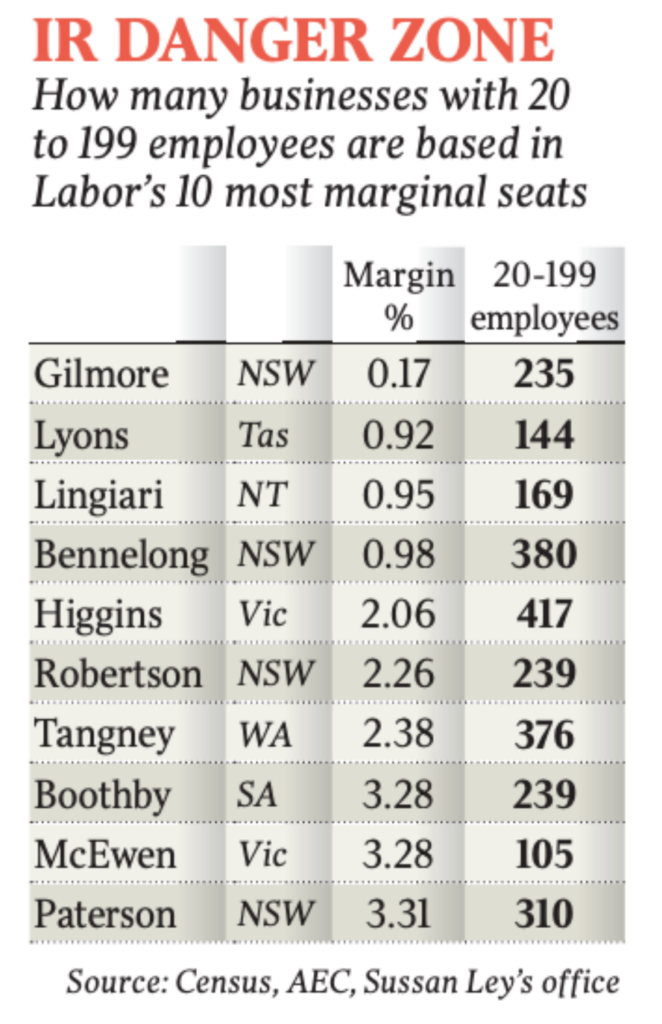
Article by Geoff Chambers, Simon Benson & Ewin Hannan courtesy of the Australian.
STANDOFF OVER BARGAINING
More than 56,000 small and medium businesses could be hit with “industrial mayhem” under Anthony Albanese’s workplace shake-up, the Coalition has warned, as key crossbench senator David Pocock pushes the government to widen multiemployer bargaining exemptions.
Workplace Relations Minister Tony Burke is under renewed pressure from crossbenchers to split the Secure Jobs, Better Pay bill or protect small businesses with more than 15 employees from industrial disputes and multi-employer bargaining if it wants legislation to pass the Senate before Christmas.
The stand-off comes as the Coalition, which wants the employee threshold raised from 15 to 200, releases analysis says reveals the government’s legislation will wreak havoc across “every sector of the economy”.
The Senate inquiry into the IR bill will hand down its report on Tuesday after hearing lastminute evidence from the Fair Work Commission and the Department of Employment and Workplace Relations.
Crossbench senators will press the commission on how it will handle new arbitration powers around employer bargaining, amid concerns from business leaders and industry groups about a spike in industrial action.
Amid intense negotiations between senior government ministers and Senator Pocock, whose vote is needed along with the Greens’ to pass the bill if other independent crossbenchers remain opposed, food manufacturers and distributors on Monday warned the legislation would push up grocery prices and worsen the cost of living crisis.
Senator Pocock, who met AiGroup chief executive Innes Willox among a raft of other stakeholders – said one of the biggest concerns raised about the IR changes was the impact on small businesses that did not meet the 15-employee exemption threshold. “The balance of evidence provided to me suggests that multi employer bargaining will be too big an impost on smaller businesses and therefore the threshold for inclusion in the non-voluntary streams needs to be higher,” Senator Pocock said.
“Of course smaller businesses can opt in to bargain for their own single-enterprise or multi-enterprise cooperative agreements instead.”
Deputy Opposition Leader Sussan Ley said the IR changes would “adversely hit hundreds of thousands of businesses”.
“The unions are licking their lips at the prospect of getting into
them and causing industrial mayhem,” Ms Ley said.
She said more than 56,000 businesses with 20 to 199 employees would be compelled to participate in multi-employer bargaining, including 6000 manufacturers, 5400 construction companies, 7500 accommodation and food providers and at least 400 mining companies.
“This does not include the thousands more across the country that have between 15 and 20 employees. Over 2.4 million businesses will also be hit by changes to contracting arrangements and forced workplace flexibility changes including being legally obligated to support work from home and flexible work arrangements,” Ms Ley said.
Joining the private sector pushback against multi-employer bargaining, Independent Food Distributors Australia chief executive Richard Forbes accused the government of failing to comprehend the impact of inflation and “skyrocketing” input costs on small and medium-sized food businesses across the supply chain.
Food distribution companies already face inflationary input costs of more than 25 per cent, largely due to energy prices, as well as many already having negotiated above-award pay increases for workers against the backdrop of a labour shortage.
Food price increases between suppliers, distributors and retailers, which are already averaging between 10 and 20 per cent, would be at risk of going higher if wage rises beyond those already negotiated were pushed higher.
The sector, which supplies to more than 60,000 retail outlets, including cafes and hospitality facilities as well as schools, hospitals, aged care homes, claims it is already operating on low margins of about 2 per cent.
Mr Forbes said food and beverage warehouse operators had seen an increase in operations costs of about 27 per cent over the past nine months.
“What government may not realise is that many of our members … have already had to negotiate wage increases above the award with individual staff, simply to retain them because of the chronic
shortages in labour,” Mr Forbes said. “This is happening organically so I don’t understand why government didn’t consult with business to see what was really going on at an operational level.
“If we are now put in a position where our members are forced to lift wages further at this time, given these significant cost pressures, members will have no choice but to increase prices to retailers who will in turn be forced to increase prices to consumers.
Tasmanian independent senator Jacqui Lambie said she had a problem with the legislation’s impact on small and medium businesses. “It won’t make a . difference to rising wages, that is for sure,” Senator Lambie said. “I want to make sure that we get this right. Small businesses have done it tough through Covid. They’re trying to pick up again, starting to get back on their feet. I do not want to slam them with unintended consequences that may come out of this bill.”
Despite calls from Senator Po-cock, Senator Lambie and industry groups for contentious multi-employer bargaining provisions to be considered next year, Finance Minister Katy Gallagher said it was not the government’s “preference to split the bills”.
“They are interconnected. I know people would like to separate out … what they see is the more contentious bits around bargaining but . it is all about getting the bargaining system working, and particularly for low wage industries,” Senator Gallagher said.
As industry groups launch campaigns piling pressure on Senate crossbenchers and the government, Senator Gallagher said the government was prepared to fight for the legislation “on its merits”.
In question time on Monday, Small Business Minister Julie Collins failed on two occasions to name a small business that sup- ported the IR bill.
“We are meeting with small businesses all the time and discuss a range of matters right across the board and we continue to have discussions as we work through this important piece of legislation that is actually about getting wages moving,” Ms Collins said.
ACTU secretary Sally McMa-nus rejected private sector claims that multi-employer bargaining would lead to more strikes. “It’s pay rises that’s the measure, not industrial action,” Ms McManus told Sky News.
In its submission to the Senate inquiry, Gina Rinehart’s Hancock Prospecting said “at a minimum the mining sector must be excluded from multi-employer bargaining”.
The iron ore, beef and coal giant, which directly employs 4500 workers and supports 9000 jobs, said the bill “puts at risk not only the interests of mining workers, but the broader economic benefits and tax and royalty revenues the mining industry makes possible”.
